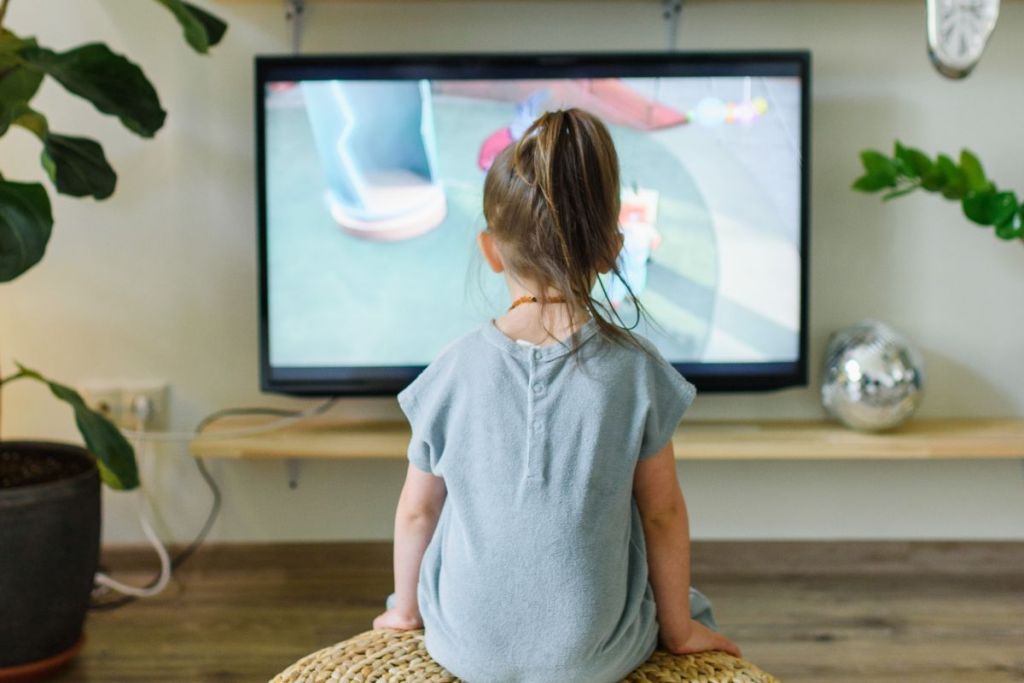When we were kids, Saturday mornings were the best. While in our pajamas, we would run downstairs and plop ourselves in front of the TV for our Saturday morning cartoons. Now that we are parents, though, many of us are wondering: is TV bad for kids? Are we doing them some sort of disservice by letting them watch it for hours on end, if not all day when we’re in a real pinch? (We’ve all been there.)
Experts weigh in on the negative impact too much TV can have on kids and provide guides for how much time your kids should spend watching TV.
How does TV affect child development?
A Canadian study researched television and its effects on child development. Researchers found an association between increased screen usage and delayed language development in children. Although experts are still studying the effects of screen time and kids, other possible dangers cited in this study include:
- inattentiveness
- lower cognitive abilities
- decreased executive function
Although many parents may think it is okay to plant their child in front of the television if the show is educational, there is still not enough research that supports these educational shows or games on a tablet benefit child development.
What happens if a child watches too much TV?
Most things, including watching TV, are not necessarily harmful in moderation. The problem arises when kids begin spending too much time in front of the TV.
Steven Dowshen, MD notes there are other concerns beyond child development when a kid spends too much time watching TV. Watching copious amounts of television can impact a child’s physical and mental health as well.
One of these health concerns is obesity. Dowshen explains that many studies connect increased childhood obesity rates to the sedentariness of watching TV. Kids who spend too much time in front of the TV are less likely to run around and engage in physical activity. They might also be more inclined to snack, especially on the unhealthy foods that appear in commercial breaks.
Dowshen also cautions about the content kids can be exposed to while watching TV. Kids sitting in front of the screen may watch violent shows or programs that depict children engaging in dangerous behaviors, like smoking, doing drugs, and drinking. In fact, Dowshen informs that kids who watch an average of five or more hours of television daily are significantly more susceptible to begin smoking cigarettes than kids who watch two or fewer hours a day.
How much TV should a child watch each day?
The dangers of spending too much time in front of the TV screen are clear. Along with possibly impacting child development, you can risk your child becoming obese or more likely to engage in risky behavior. But how much TV is too much TV?
The recommended daily TV time is broken down into age groups. Although minimalizing screen time as much as possible is the best way to avoid the dangers of excessive screen time, most experts suggest the following guidelines:
- Under age 2: Pediatricians and other health experts agree that kids under 2 should not be watching TV. They also encourage parents not to keep the television running in the background either.
- Ages 2 to 5: Although avoiding screen time as much as possible is still important at this age, most experts suggest no more than an hour a day for this age group.
- Ages 5 to 17: With school-aged kids, monitoring screen time can be more challenging because so many schools are moving towards digital learning. However, pediatricians recommend no more than two hours a day of screen time outside of homework.

How do I stop my child from watching too much TV?
If you’re worried your child is watching too much TV, there are ways to cut down your kids’ TV consumption. Assess how much time your kid spends watching TV to get a better idea of how much time needs to be reduced.
When using smart devices or streaming services, you can utilize features to minimize screen time. You can change your settings to not automatically play the next episode when watching shows. Many streaming services now offer sleep timers that will stop the show or movie after a set amount of time. Using a timer can help reinforce a limit to screen time.
Parents can also fill normal TV time with other activities. For younger kids, set up coloring or craft activities to keep them engaged. Convincing your tween or teen to step away from the TV may be more challenging. Consider creating a family game night or establishing family fit time, even if this is a small walk around the neighborhood.
Setting up family expectations and following through consistently is key. Support your kids’ transition to less time on screens by being an example and engaging less on your screens as well. Ways to keep consistency include:
- screen-free times where everyone in the family is off their screens
- screen-free zones or places in the house where no screens are allowed (for example, in the dining room or in the family room)
- more engagement with kids, whether this is through structured activity times or more casual conversations
Whether it’s family movie night or Sunday football games, watching television can provide an opportunity to come together, but it is important to make sure your kids aren’t watching too much TV.




